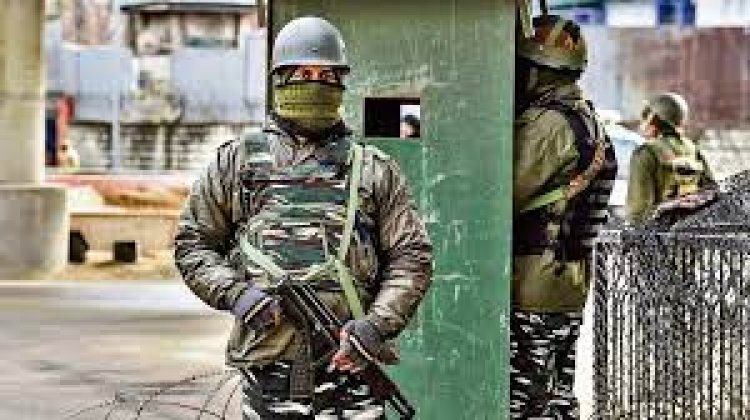Jammu and Kashmir: Lurking Terror Threat
Asia News Agency

The killing of a head constable of the Jammu and Kashmir Police in the third targeted attack in the Valley in three days is a reminder of the lurking terror threat. Earlier, a migrant labourer who worked in an apple orchard was shot dead and a police Inspector was shot at while he was playing cricket, leaving him critically injured. Leaders of various political parties have condemned the attacks in one voice.
Ironically, a few days back, the Lieutenant Governor had claimed that terrorism was taking its last breath.
The key elements of rather government’s anti-terror winter strategy, according to The Tribune “were to keep a close watch on the situation and step up surveillance in view of the increase in infiltration attempts before snowfall blocked the routes. Also on the agenda was the fallout of the Israel-Hamas war in the Valley, and how Pakistan could try to create trouble.”
Assembly elections should not be delayed
In this context, The Tribune writes the ceasefire violations by Pakistan Rangers along the International Border in Arnia sector “cannot be seen in isolation. The successful conduct of the G20 Tourism Working Group meeting in May was considered significant not only for Indian diplomacy but also for J&K’s economic prospects. With the rise in the influx of tourists, several remote locations have been opened to the public. In working towards creating an environment of peace and security…. Assembly elections…..should not be delayed any further."
Invoking abrogation of Article 370 as a potent election weapon
The elections would depend on the agenda that BJP will take prior to the general elections. On Jammu and Kashmir, according to Luv Puri (author of Across the LoC) the government is likely to claim voter support on the abrogation of Article 370, which granted special status to Muslim-majority Jammu and Kashmir. The Supreme Court has reserved the judgment on this after exhaustive hearings in September 2023. The impact of J&K, a relatively smaller unit with a population of nearly 14 million with five Lok Sabha seats, according to Puri “on the overall Indian political landscape, particularly in the Hindi-speaking states with considerable electoral clout, is less understood….”
Article 370 has remained part of the BJP’s combative narrative on J&K, despite opposition from national and regional parties.
“The opposition to Article 370 had its resonance in the Hindi-speaking states — Rajasthan, Madhya Pradesh, Uttar Pradesh, Haryana and Delhi. The reasons are numerous: a history of inter-religious tensions, particularly around the time of Partition, being the foremost factor. The special status for Muslim-majority J&K was seen by some as a historically-flawed concession. These states alone account for 28% of the total Lok Sabha seats. As it happened in 2019, the BJP hopes to repeat its high electoral success rate in these states. That is why the abrogation of Article 370 will continue to be one of the issues in the upcoming elections. The Congress and the Opposition’s narratives on this issue are ambivalent. They have failed to convey, or perhaps it is simply difficult to convincingly argue, that asymmetrical federalism provides various states customised constitutional provisions and, in some respect, J&K was no exception.”
Constitutional justification of revoking Article 370
BJP also cites the Constitution in its justification for the abrogation. “…Parts XXI and XXII of the Indian Constitution whose Article 371 grants some states temporary and special provisions. There are customised provisions for Maharashtra (Vidarbha and Marathwada) in addition to Articles 371A (Nagaland), 371B (Assam), 371C (Manipur), 371D and E (Andhra Pradesh), 371F (Sikkim), 371G (Mizoram), 371H (Arunachal Pradesh) and 371I (Goa). In fact, special powers had also been given to Gujarat, the home state of the prime minister. But these nuances are difficult to explain to the electorate in binary terms.”
Justification on grounds of national security
Another potent issue linked with J&K, according to Puri “is national security that has often surfaced at critical moments. Directly or indirectly, J&K played a critical role in bringing the BJP back to power at the Centre twice. In 1999, infiltration by Pakistani troops in the Kargil sector, part of the erstwhile state of J&K, a daredevil offensive by the Indian army, coupled with the intervention by the then US president, Bill Clinton, led to the withdrawal of the Pakistani army from the Indian side of the Line of Control. This swayed the national mood in favour of the Atal Bihari Vajpayee-led National Democratic Alliance in which the BJP was the leading alliance partner in the elections held a few months after the Kargil war ended. Consequently, the BJP ruled India for the first time for a full term of six years. In the same vein, a number of independent surveys have indicated that the Pulwama suicide attack on the ‘jawans’ (soldiers) of the Central Reserve Police Force on February 14, 2019 was instrumental in creating a decisive wave that resulted in the party winning 303 seats. This was surprising as some of the Hindi-speaking states, in their respective assembly elections just a few months ago, had voted for the Congress. This proves that in a state of real or perceived security threat, the national mood, particularly in the electorally significant Hindi-speaking states, favours the right-wing incumbent.”
To sum up, Puri concludes “the impact of historical forces, which are a legacy of Partition, and binary discussion of federalism in India make the issues around J&K one of the potent instruments selectively invoked by the BJP. The antidote for the Opposition lies in first understanding the potency of issues around J&K in the relevant states and then being prepared to build an effective counter-strategy.”
















